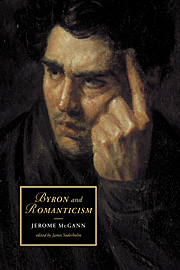Book contents
- Frontmatter
- Contents
- Acknowledgments
- General analytical and historical introduction
- PART I
- PART II
- 10 A point of reference
- 11 History, herstory, theirstory, ourstory
- 12 Literature, meaning, and the discontinuity of fact
- 13 Rethinking Romanticism
- 14 An interview with Jerome McGann
- 15 Poetry, 1780–1832
- 16 Byron and Romanticism, a dialogue (Jerome McGann and the editor, James Soderholm)
- Subject index
- Authors index
- CAMBRIDGE STUDIES IN ROMANTICISM
11 - History, herstory, theirstory, ourstory
Published online by Cambridge University Press: 22 September 2009
- Frontmatter
- Contents
- Acknowledgments
- General analytical and historical introduction
- PART I
- PART II
- 10 A point of reference
- 11 History, herstory, theirstory, ourstory
- 12 Literature, meaning, and the discontinuity of fact
- 13 Rethinking Romanticism
- 14 An interview with Jerome McGann
- 15 Poetry, 1780–1832
- 16 Byron and Romanticism, a dialogue (Jerome McGann and the editor, James Soderholm)
- Subject index
- Authors index
- CAMBRIDGE STUDIES IN ROMANTICISM
Summary
Because “history” takes place as a matter of pluralities, it should always – like Herodotus' exemplary work – be written in the plural. But of course it is not, of course people tend to write Theirstories in the singular, tend to write a history of something or other, and tend to suggest thereby that history is integral, uniform, and continuous. We are all familiar with Thesestories – for example, with the commonplace view that there are basically three theories of history, the degenerative, the progressivist, and the cyclical (with due allowance made for the spiral variant, usually imagined as moving in an upward rather than a downward direction).
Thistory, thus imagined, creates problems for people who work as historians, a fact which people who work as anthropologists have been pointing out to them for some time now. But history thus imagined is worse still for people who write and study literature; indeed, the linear imagination of history was probably the single most important factor in separating literary work from historical studies in the twentieth century.
In literary criticism, for example, the classic argument against a historical method in criticism has been that facts in poetry are not like facts in history: a fact is a fact in history (whether we mean by the term “history” the historical event or the historical text), but in poetry facts transcend any one-to-one correspondence relation. In poetry facts are taken to be multivalent, or as we sometimes like to say, symbolic.
- Type
- Chapter
- Information
- Byron and Romanticism , pp. 223 - 230Publisher: Cambridge University PressPrint publication year: 2002



